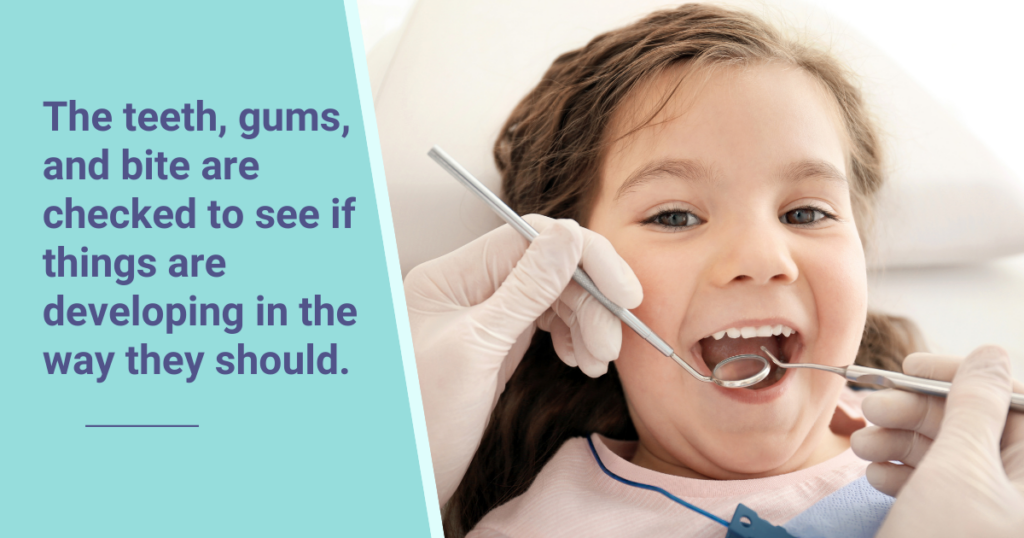Even though your child’s baby teeth will be replaced with permanent adult teeth, it’s still important to take care of them. In this blog, we’ll cover:
- Why you should take care of your child’s baby teeth
- When your child should start going to the family dentist
- How to prepare your child for the first visit
- What to expect at your child’s checkup appointment
- How often you should bring your child for routine checkups
- Is my child’s visit covered by BC’s Medical Service Plan (CareCard)?
- Are there other support programs for my child’s dental care?
- Who we are
WHY DO I NEED TO TAKE CARE OF MY CHILD’S BABY TEETH?
Baby teeth can get cavities just like adult teeth. If the cavity becomes big, the tooth can become painful or even infected. If the baby tooth can’t be saved, it may need to be removed. We all know that teeth are necessary for eating, speaking and smiling, but did you know that baby teeth are also space holders for adult teeth? Baby teeth are meant to stay in place, until your child is around 12 years old. If a baby tooth is removed or lost too early, neighbouring teeth may tip into the space. By the time the adult tooth is finally ready to come out, the space may no longer be big enough for it to come out straight.
When Should my Child Start Going to the Family Dentist?

HOW CAN I PREPARE MY CHILD FOR THE FIRST VISIT?
- Read a children’s book about going to the dentist.
- Watch an educational video on YouTube about going to the dentist.
- Bring your child’s favourite stuffed animal or comforting blanket to the visit.
- Role-play at home using toys as dentists and patients.
- Bring your child along to your own dentist appointment. This may help your child get used to the dentist environment.

WHAT IS DONE AT MY CHILD’S CHECKUP VISIT?
- A ride in the dental chair
- A review of the medical and dental history.
- A checkup of the teeth, gums, and the bite to see if things are developing in the way they should.
- Depending on the age and cooperation of your child, x-ray images may be taken to check for cavities and dental development.
- A gentle cleaning to remove plaque, if applicable.
- Fluoride treatment, if applicable.
- A review of home care recommendations, along with what habits to watch out for.
- A meeting with Twinkles, the unicorn dental puppet, to teach your child good brushing and flossing habits.
- Your child gets a dental care goodie bag and a prize from the treasure chest at the end of the appointment.

HOW OFTEN SHOULD MY CHILD GO FOR ROUTINE CHECKUPS?
Generally, routine checkups (also known as recall exams) are recommended every 6 months. However, each child is different, so your child’s suggested frequency may vary..
Is my child’s visit covered by BC’s Medical Service Plan (Carecard)?
The visit may be covered by MSP if your child is eligible for the Healthy Kids Program. This government-funded program covers up to $2,000 in basic dental services every 2 years for children in low-income families meeting certain criteria. Vivant Dental is pleased to participate in the Healthy Kids Program in an effort to make dental care more accessible in our community. Contact us to find out if your child has active coverage under this program, or visit the Healthy Kids Program on the BC government website to learn more.
Are there other support programs for my child’s dental care?
- Private insurance: If you have a private insurance policy, such as from your employer, check if you can add your child to your dental plan.
- Canada Dental Benefit: This is a new nation-wide program starting December 1, 2022 for children under the age of 12 who do not have access to private dental insurance, and whose families are earning less than $90,000 per year . This program is administered by the Canada Revenue Agency. (Related article: The Canada Dental Benefit – Is it for you?)
- UBC Children’s Dental Program: The Faculty of Dentistry at the University of British Columbia offers free basic dental services to children of low-income families who are not eligible for other government-funded programs. Treatment is provided by dental students during the school year. Visit the UBC Faculty of Dentistry website for more information.
- Fluoride Varnish Program: Children under the age of 3 who are not under regular care of a dentist can receive a free cavity risk assessment and fluoride varnish application at various Fraser Health Public health units. Visit the Fraser Health website for a location near you.
Who We Are
Dr. Anthony Bellusci and Dr. Vivian Chow are general dentists and owners of Vivant Dental, located in the Panorama area of Surrey, BC. We enjoy working with kids and we strive to create pleasant dental experiences for . If you have any questions or would like to make an appointment with us, feel free to contact us.
